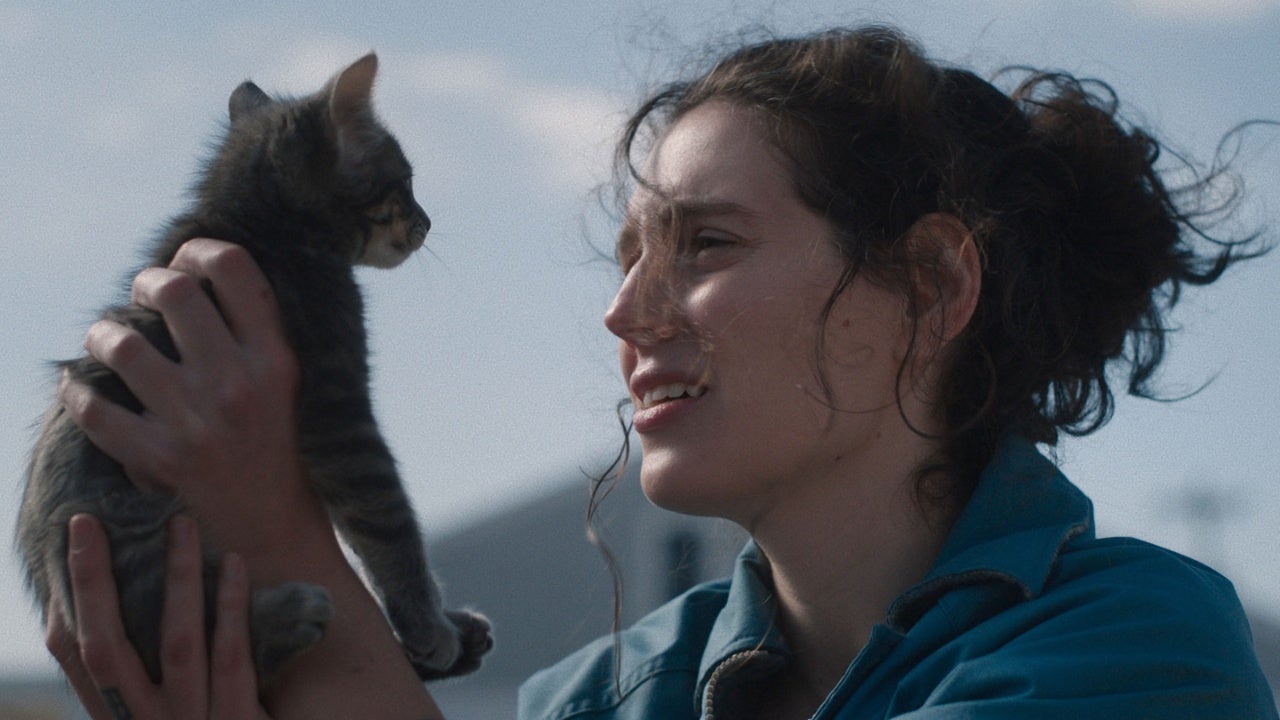
Sorry, Baby is now playing in select theaters, and opens nationwide Friday, July 25.
There’s an effortless effervescence to the bond between the two central characters of Sorry, Baby: Agnes (Eva Victor) and her pregnant best friend Lydie (Naomi Ackie). Former grad school students in the quaint Massachusetts town where Agnes still lives and now teaches, they’re written and played with a lived-in closeness, giddy playfulness, and nurturing warmth. Agnes is the delightful eccentric, Lydie the balanced grounding force.
But that’s only one layer of this bittersweet, unassuming stunner. Writer-director-star Victor (who identifies as nonbinary and uses they/she pronouns) assembles one of the year’s best debut movies from nonchronological glimpses of a few years surrounding Agnes’ sexual assault at the hands of a former mentor and instructor. The way this event and its aftermath are depicted is quietly piercing, life-affirming, and precisely humorous – an unexpected quality given the subject matter. It’s a character study that achieves universality not by sidestepping the specificity of Victor and Agnes’ points of view, but by observing this personal tragedy through a panoramic, generous lens.
The friends’ goodbye after a weekend together (along with other hints) implies Agnes is on the mend, but not entirely out of the woods. The most harrowing details and snapshots of her hard-earned road to a new sense of normalcy come later, in segments set in the near past. This out-of-sequence structure is practically a way of bringing optimism to life in words and images. It prioritizes letting us know that Agnes survives her devastating ordeal; we first meet her in a state of safety and security, before knowing anything about what’s happened to her. And though Lydie’s concern for her friend’s mental state remains, Agnes reassures her that the worst has passed, and that she might even be ready to meet new people romantically.
And yet, despite opening Sorry, Baby at the mid-point of its story, Victor leaves enough room for dramatic growth as she moves backwards and forwards in time. Though it shows how Agnes grapples with anger and resentment, the movie doesn’t peddle virtuous resilience or cathartic revenge. Instead, Sorry, Baby argues that the only way forward involves sitting with the betrayal of trust and the impotence that sets in after being victimized, and letting them slowly run their course. It’s impressively and conclusively stated: There are no short cuts to recovery, and no certainties that we’ll see the other side of sorrow. But saving yourself is worth trying.
Victor doesn’t just commiserate with her charmingly idiosyncratic character, but portrays her as a bright individual whose academic intelligence helps her see the unfortunate situation with restraint, rather than in a visceral, self-destructive manner. But intellectualizing the wound can’t keep it from stinging. Such composure also applies to Sorry, Baby’s imagery. The assault is only implied with exterior shots of the house where it happens. The camera never steps into that place. In turn, the interior spaces in the home Agnes turns into her refuge from the world become Sorry, Baby’s main locations.
How Victor gives her supporting characters memorable, convincingly flawed personalities is another sign of Sorry, Baby’s exceptional, fine-tuned virtuosity. The men in Agnes’ life range from her abuser, Professor Preston Decker (Louis Cancelmi), to her mature, yet clumsily enchanting neighbor, Gavin (Lucas Hedges). Late in the movie, Gavin and Agnes share a moment of playful vulnerability in the bathtub – they’re physically naked, but even more exposed emotionally. That same tub witnesses Agnes at her most broken; that it then serves as the venue for a heartfelt intimacy she may have thought impossible attests to the healing powers of time.
Victor’s richly textured writing extends even to one-scene characters like Pete (John Carroll Lynch), a cantankerous restaurant owner who shows Agnes compassion in the form of a sandwich and an honest conversation following a reminder of her assault. There’s also a tactless doctor, the seemingly empathetic school officials, and classmate Natasha (Kelly McCormack), who holds a one-sided rivalry with Agnes and earns laughs with her peculiarly, perpetually disgruntled expression.
A jury duty scene poses one of the most revelatory, and difficult questions of our time: What do we expect from predators, abusers, and users? Is imprisonment the solution or is there a different path towards justice or even atonement? And what does that mean for both the victim and the offender? Victor handles Agnes’ convoluted thoughts about Professor Decker with well-realized ambivalence. Does she want to burn his office to the ground? Perhaps. But does she wish he would rot in prison? That’s trickier. Her hope is for him to learn from his wrongdoings and evolve, and not just remain unchanged but behind bars.
Building on her work on TV shows like Billions and her massively popular social media channels, Sorry, Baby is a spectacular flaunting of Victor’s filmmaking and acting prowess. All of the diminishment and doubt that Agnes weighs in order to move along are visible on Victor’s puzzled faced – we can almost see how she’s processing the reality of what has happened, and how unequipped she feels to confront it, in real time. (Adopting a cat seems like an appropriate move.) Victor’s performance melds perfectly with the dialogue of her script, often depicting the character’s mental jumble through cutting punchlines.
It’s meaningful that her introduction to a wider audience leads with an apology: The “sorry” in the title is aimed not only at the infant Agnes has a one-sided chat with, but to Agnes herself and those of us watching as well. It makes us aware of and offers solace for all the hardships of being alive. Agnes learns not to abhor the darkness inside and strives to live despite its presence.
That’s the linchpin of her friendship with Lydie (portrayed luminously by Ackie). When the former gives into her worst instincts, the latter doesn’t judge her feelings, nor does she try to convince her not to feel them. Instead, she accepts them at face value, as hopefully fleeting, but more than justified. That doesn’t mean Lydie won’t try to stop Agnes from making an irreparable mistake, but that she is willing to accept her loved one’s untidy, even scary emotions. Lydie’s unwavering consistency saves Agnes from succumbing to despair; few movies have ever depicted such an unconditional embrace of a friend’s chaotic being.
Similarly, Victor grants Sorry, Baby an abundance of wisdom – the kind that’s not sanctimonious or punitive, but generous and sympathetic. It’s as if her intent with the film is to comfort, to shoulder some of our shared burdens, and say, “even if I haven’t been in your exact position, I accompany you in your struggles.” Not because she has any surefire answers about how one continues after something bad occurs – but because she wants to search for them together.











